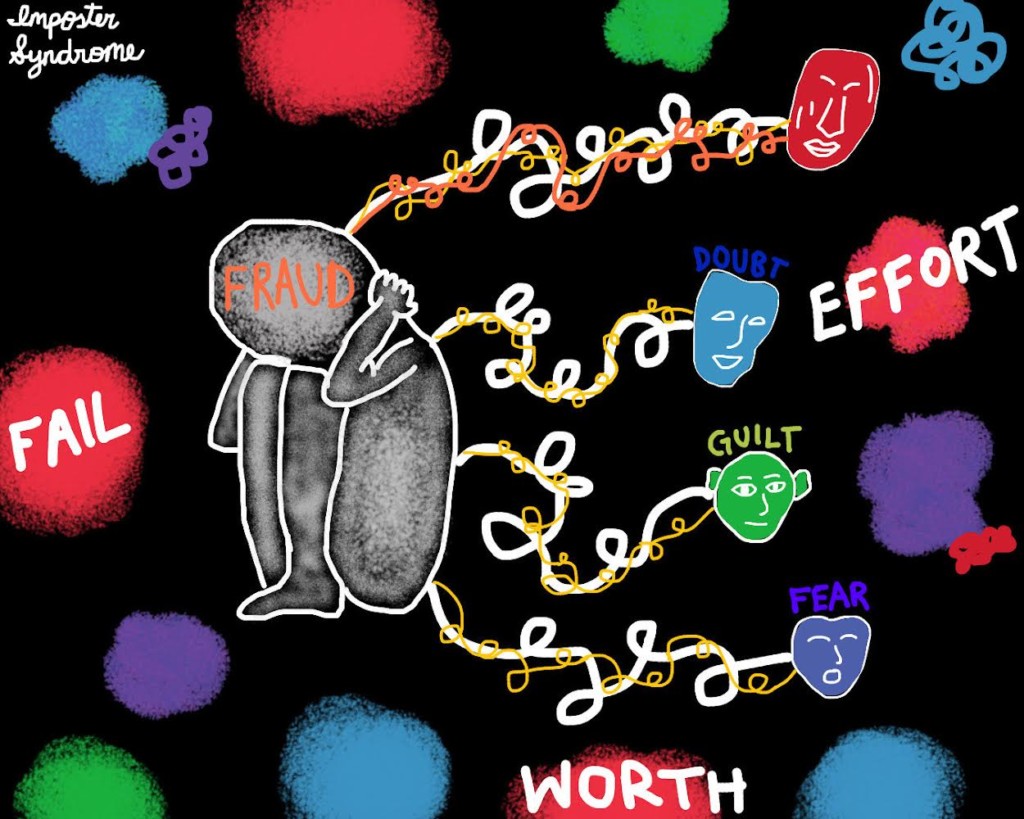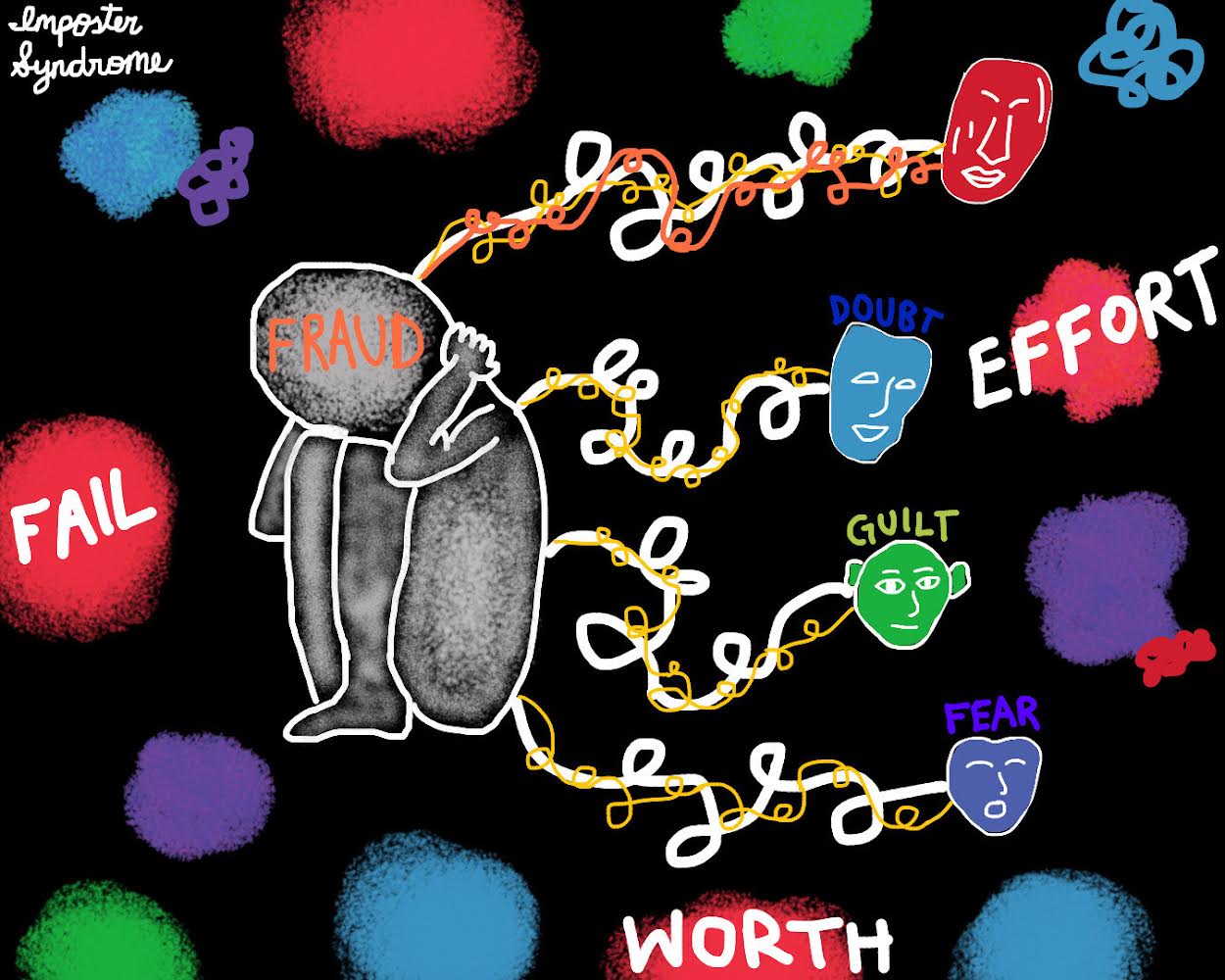Imposter syndrome is the college plague. Most students have experienced this feeling at least a few times — that all of your accomplishments are somehow less than everyone else’s, that everything you’ve achieved just happened by luck, that you’re somehow the only one in the room who shouldn’t really be there, that you’re just faking your way through it all. But why is it so hard to feel like we’re in the right place, and that we deserve to be where we are? And how do we make this invasive, corrosive feeling go away?
Imposter syndrome arises from the high pressure to achieve and succeed, whether that comes from ourselves, our families, our peers, or all of the above. The feeling of not belonging in the places we have entered — whether that’s a particular class, lab, club, or even the school itself — is a harsh mental response that reinforces the idea that we are less than those around us. This out-of-place feeling may be amplified if you’re in a minority group, with isolation in an undiverse environment piling onto the message that you simply don’t belong. It’s a vicious, self-fulfilling prophecy that drives people to leave fields they love and are capable of succeeding in. Imposter syndrome is the worst weed-out of them all.
In any competitive field, there is always somewhere higher to look, someone else to compete against, and someone to make you feel like you have no right to be where you are. There will always be something else to look at and say, “well if I could do that, then I would deserve this.” This is the true fraud you should be worried about — not yourself or your accomplishments, but the idea that any number of accomplishments will make you feel like you belong. Belonging, ironically, is something that has to come from yourself first. If you don’t accept that you could ever belong, no amount of good grades or internships or handshakes from intimidating professors will ever make you feel that way.
As someone who often suffers from a raging case of imposter syndrome, the thing that helped ease this feeling is the fact that practically everyone I know and I look up to have felt — or still feel — this exact same way. And when you look at someone and constantly say “oh, they’ve definitely got their stuff together” just to find out they also spend an unhealthy amount of time thinking “I am a hot mess and have no idea what I’m doing,” it can be pretty cathartic. That’s not to say it’s good that so many of us feel this way, but the fact that our struggles are such a common narrative reveals that seeming effortless is an utter and total lie, and that grappling with our exterior portrayals is, in the end, deeply human. Because if everyone feels like a fraud, then at the very least we would all be frauds — and then we would all belong together.
I feel the most imposter syndrome in my involvement with the arts. My brain is so trained to only take my academic achievements seriously that it tries to ignore and put down any other kind of success. Even though I’ve played music my entire life, I struggle to label myself as a musician, thinking I haven’t earned the title. Despite the fact that I wrote creatively since I was a young kid writing two-person plays in crayon, I can rarely confidently call myself a writer. And though I love to draw and paint, I’d laugh if someone ever called me an artist. It’s such a silly, contradictory thing that even as I type it out, I think, how in the world do I keep convincing myself I’m not any of these things? But, as anyone with imposter syndrome knows, it’s not about logic in the end. It’s about your brain tricking you into believing that you are less capable, less skilled, less deserving than you are.
In other words, everyone is faking it — at least a little bit. Everyone projects an image of themselves, whether consciously or not, that is just a bit more polished than the swirling mush we all have inside ourselves. There is no one way to belong, and even that one kid in your lecture that you’re 99% sure is an actual certified wizard probably has their own worries, their own pressures, their own feelings of inadequacy.
Neil Gaiman, perhaps my favorite author ever, once talked about his experience where he went to an event full of famous, cool, accomplished people, and he was on-edge waiting for someone, anyone, to finally discover that he didn’t qualify to be there. And then he describes how he talked to another man there who felt like he didn’t belong there either, because all he ever did was do what he was told. And every time I reach the end of this particular story, when Gaiman reveals that it was Neil Armstrong who said this to him, who felt that he didn’t deserve to be with such accomplished people, I feel a bit of comfort. It’s reassuring to feel like everyone’s got a smidge of fraud in them; everyone’s just trying their best, trying to seem like they know what the hell is going on. And if no one really knows, then maybe we can all just be wonderful, lucky, out-of-place frauds together, and then maybe we all really do belong.


